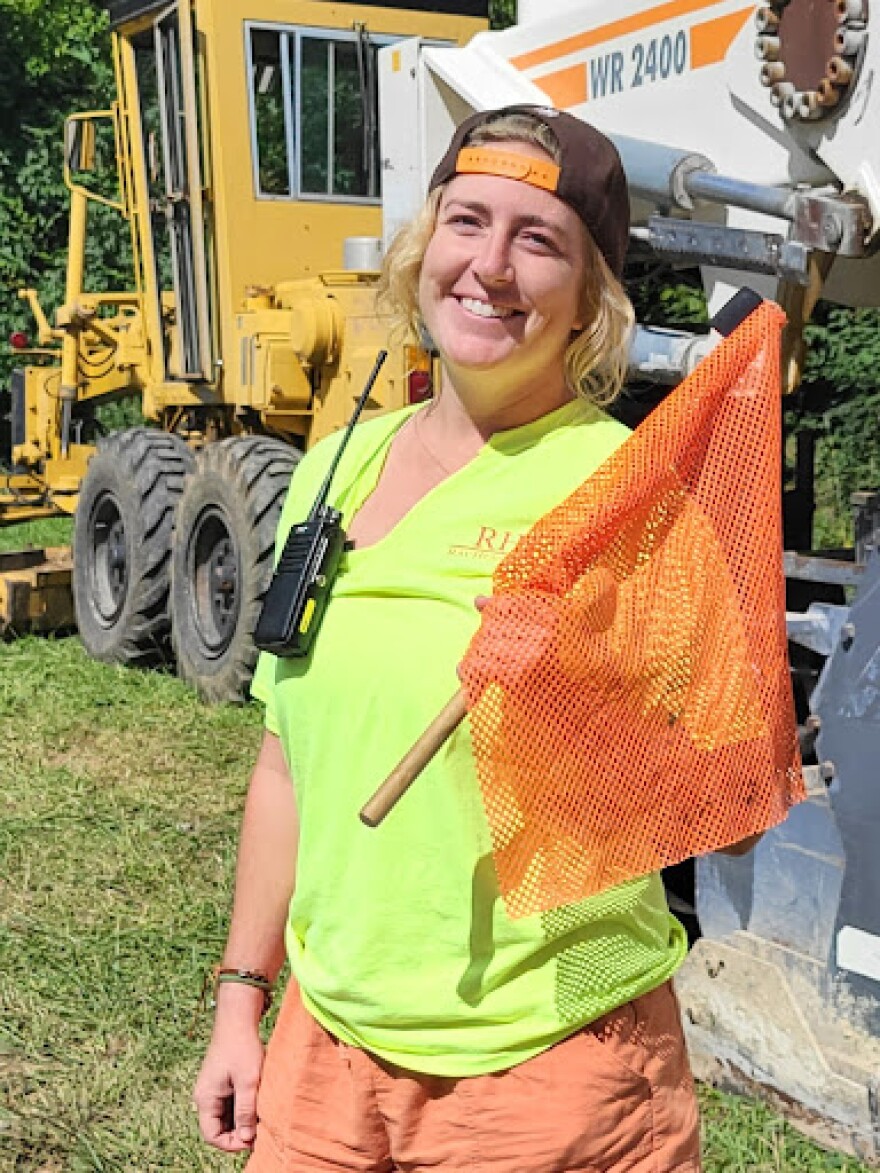When I tried googling Runyan Road in Clark County, where the paving crew I’m interviewing is working, it doesn’t even show up.
“It’s the last dirt road in Clark County,” said Abby Wilt, who was flagging traffic the day I visited as that dirt road was being paved.
Wilt explains the process: “We had to stick an asphalt material down to prime it to go over the dirt, because there was no hard surface there before, and then using two layers of tar and gravel just to make it stronger. It’s a surfacing, not a resurfacing.”

Wilt is a traffic flagger for Hensley Construction. It’s been her summer job for 10 years.
“We work for several different municipalities, whether it be the township or county. Sometimes (the) state level,” she said, standing alongside the quiet rural road.
Flagging traffic can be one of the most brutally boring jobs to have, especially when you’re out in a very rural area and there isn't much traffic to flag. It’s a lot of waiting around.
This was one of those days, as a solitary truck passed while we were talking.
“He’s hauling concrete in and out back there,” Wilt said, waving to the driver. “So I’m just radioing, talking to him whether he can get through or not. A lot of times we have to work with farmers hauling whatever.”
“I do like to stay busy,” Wilt said, describing the variety of work the construction team does. “I like some of those bigger jobs. Like, one time I had to walk from Xenia to Jamestown practically running backwards with my hands in the air to keep up with the crew. And that job took us more than a week, so I got in shape that week.”
Wilt listened as one of the crew gave instructions to another over the walky-talky clipped to her shirt that they use to communicate. She said that flagging traffic entails more than just working a stop-and-go paddle.
“You’ve got the safety of the crew, and working with them as a team to know when they might not be looking and paying attention when they should be. And the safety of the public while keeping your own safely in mind,” she said.

Wilt recalled a scary event that happened recently with a close call when a driver ignored her directions and drove through the construction zone.
“I felt his car brush me. He was already stopped and then went ahead anyway. And my chip spreader operator had to slam on his breaks with that big heavy piece of equipment,” she said, letting out a shudder at the recollection. “Most of the time, people want to bite your head off. So I usually come up to them (and say), 'Hey, how you doing, how’s your day going?'”
And every now and then you get some people who are really difficult to deal with. Like the one guy who was mad about the road in front of his house being tarred and graveled.
“He came out with a water hose and started spraying what had just been done, and threatened to bring his shotgun out, too,” Wilt said, shaking her head.
The tar-and-gravel method of paving, or chip seal, actually makes a really great road surface. And once the gravel gets settled into the tar, the textured surface gives more traction than a smooth surface.
“We have some of them that last up to 20 years, and the emulsion sinks into the cracks of the previously paved road,” she explained. “And when you put fresh asphalt down (instead) it doesn’t have the pliability to do that and causes those alligator patches and breaks and potholes.”

Flagging traffic can be a brutally hot job in the summer, especially with the record-high temperatures over the past few years.
“You just drink a bunch of water. Sometimes bring an umbrella. Sometimes you get lucky enough to have a shade tree around,” Wilt said, laughing.
And when it is hot and you’ve been drinking a lot of water, and there are no bathrooms in sight, you learn to embrace nature.
We “double door it — open both doors,” Abby said, laughing. “Hopefully there’s a corn field or a tree line.”
But you also get to see some pretty unusual things when paving hundreds of miles of Ohio roads.
"It’s cool working out here in the summertime, all the stuff you get to see. Sometime’s I’ll be parked next to some zebra’s out in the middle of nowhere in Preble County,” she said.
And sometimes, Wilt added, the kindness of strangers takes you by surprise.
“One time, (I) met this old man. I said, 'Oh, am I parked in your grass? I’m so sorry,'” she recalled. “He said, 'Oh no you’re good. I’m just making sure you are alright. Hey, do you want a cabbage?' I said, 'Oh I love cabbage, I’ll take it home and put it in a roast.' I got the biggest head of cabbage that day from the sweetest old man.”
Another car went by and the woman driver slowed down and gave us a friendly wave.
“It’s always nice when you get the little old ladies passing through with a cold bottle of water and people actually thanking you for your job instead of cussing you out and taking it personally that we’re doing the road,” Wilt said as we watched the car disappear down the road.
So next time you’re traveling down Ohio’s roads and come across construction delays, remember, it’s not about reaching that final destination, it’s how you travel the road that takes you there.


